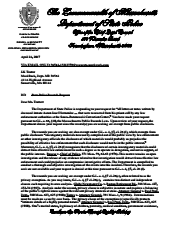Aaron Hernandez’s Suicide Notes (State Police)
It is a clone of this request.
| Submitted | April 21, 2017 |
MuckRock users can file, duplicate, track, and share public records requests like this one. Learn more.
Communications
From: J.K. Trotter
To Whom It May Concern:
Pursuant to the Massachusetts Public Records Law, M.G.L. c.66, §10, I hereby request the following records:
Copies of all letters or notes written by deceased inmate Aaron Josef Hernandez (born November 6, 1989) that were recovered from his prison cell by any law enforcement authorities at the Souza-Baranowski Correctional Center, where Hernandez was imprisoned at the time of his death on April 19, 2017.
I also request that, if appropriate, fees be waived as we believe this request is in the public interest, as suggested but not stipulated by the recommendations of the Massachusetts Supervisor of Public Records. The requested documents will be made available to the general public free of charge as part of the public information service at MuckRock.com, processed by a representative of the news media/press and is made in the process of news gathering and not for commercial usage.
I expect the request to be filled in an accessible format, including for screen readers, which provide text-to-speech for persons unable to read print. Files that are not accessible to screen readers include, for example, .pdf image files as well as physical documents.
In the event that there are fees, I would be grateful if you would inform me of the total charges in advance of fulfilling my request. I would prefer the request filled electronically, by e-mail attachment if available or CD-ROM if not.
Thank you in advance for your anticipated cooperation in this matter. I look forward to receiving your response to this request within 10 business days, as the statute requires.
Sincerely,
J.K. Trotter
From: Kelly, Siobhan (POL)
Dear Mr. Trotter:
The Department of State Police is responding to your request for “all letters or notes written by deceased inmate Aaron Josef Hernandez … that were recovered from his prison cell by any law enforcement authorities at the Souza-Baranowski Correction Center.” You have made your request pursuant to G.L. c. 66, §10, the Massachusetts Public Records Law. Upon review of your request, the Department denies your request since the record(s) you are seeking are exempt from public disclosure.
The records you are seeking are also exempt under G.L. c. 4, §7, cl. 26 (f), which exempts from public disclosure “investigatory materials necessarily compiled out of the public view by law enforcement or other investigatory officials the disclosure of which materials would probably so prejudice the possibility of effective law enforcement that such disclosure would not be in the public interest.” Moreover, G. L. c. 4, §7, cl. 26 (f) recognizes that the disclosure of certain investigatory materials could detract from effective law enforcement to such a degree as to operate in derogation, and not in support, of the public interest. Bougas v. Chief of Police, 371 Mass. 59, 62-63 (1976). This matter remains an open investigation and the release of any evidence related to that investigation would detract from effective law enforcement and could prejudice or compromise investigative efforts. The Department is compelled to conduct a thorough and objective investigation of the events into this incident. Therefore, the records you seek are not available and your request is denied at this time pursuant to G.L. c. 4, §7, cl. 26 (f).
The records you are seeking are exempt under G.L. c. 4, §7 cl. 26(c), often referred to as the privacy exemption. As you may know, G.L. c. 4, §7 cl. 26(c), contains two distinct and independent clauses each requiring its own analysis. Globe Newspaper Co. v. Boston Retirement Bd., 388 Mass. 427, 432-34 (1983). Analysis under the second, privacy clause is subjective in nature and requires a balancing of the public’s right to know against the relevant privacy interests at stake. Attorney General v. Real Prop. Dept., 380 Mass. 623, 625 (1980); Torres v. Attorney General, 391 Mass. 1, 9 (1984). Determinations must be made on a case by case basis. The privacy clause of the exemption (c) specifically protects “intimate details of a highly personal nature.” Attorney General v. Real Prop. Dept., 380 Mass. 623, 625 (1980). One’s marital status, legitimacy of children, paternity, medical condition, government assistance, substance abuse, family disputes and reputation are examples of the kinds of information the exemption was designed to protect. Id. at 626 n.2. Furthermore, the exemption will apply only where the privacy interest of the record subject outweighs the public interest in disclosure. Attorney General v. Collector of Lynn, 377 Mass. 151, 156 (1979). See, e.g., Supervisor of Public Records Opinion, SPR02/230 (2002)(“A report [over the telephone to police] of domestic violence is the type of information the second clause of the privacy exemption is designed to protect”). See also, Opinion of the Supervisor of Public Records, SPR05/063 (emergency 911 call of family member concerning suicide attempt of another family member not subject to public dissemination pursuant to privacy exemption of G.L. c. 4, §7, cl. 26 (c).
In this particular instance, the Department takes the position that the information you seek implicates a matter of an intimate detail of a highly personal and private nature. In this instance, the family’s privacy interest under these types of circumstances considerably outweighs the public’s interest in disclosure. Peckham v. Boston Herald, Inc., 48 Mass. App. Ct. 282, 287-288 (1990); see Prosser & Keeton, Torts § 117, at 860-861 (5th ed. 1984). As you are aware, your request relates to a suicide and any notes left by the decedent. The Department asserts that the privacy exemption clause specifically exempts from public disclosure information relating to and surrounding such tragic and sensitive personal matters. See National Archives & Records Adm. v. Favish, 541 U.S. 157 (2004) (The United States Supreme Court ruled under the Federal Freedom of Information Act (FOIA) that “family members have a personal stake in honoring and mourning their dead and objecting to unwarranted public exploitation that, by intruding upon their own grief, tends to degrade the rights and respect they seek to accord to the deceased person who was once their own.”)
Finally, the Department states that the records sought by your request are exempt under G. L., c.4, §7 cl. 26(a), which exempts from public disclosure records that are specifically or by necessary implication exempt by statute. In this instance, the Department references G.L. c. 40, § 36A, which prohibits: (1) revealing the identity of persons who have attempted/committed suicide while in police custody; and (2) disclosing the attendant investigative facts of a suicide that occurs in police custody to anyone other than the Medical Examiner, the next of kin and law enforcement. Although G.L. c. 40, § 36A does not specifically apply to the Department of Correction, given the purpose of the statute and the legislature’s explicit bar to public disclosure of these types of records in comparable circumstances, the Department considers these records exempt by necessary implication and denies your request accordingly. G.L. c. 40, § 36A further supports the determination that these records are exempt pursuant to the second clause of G.L. c. 4, § 7 cl. 26(c), as there is a strong public interest in maintaining the confidentiality of such records and the privacy of affected individuals.
If you object to this response, you may appeal to the Supervisor of Records in accordance with M.G.L. c. 66, §10(b) and 950 CMR 32.00. Thank you for your time and attention to this matter.
Siobhan E. Kelly
Staff Counsel
Office of Chief Legal Counsel
Massachusetts State Police
470 Worcester Road
Framingham, MA 01702
Tel: (508) 820-2337
[cid:image001.png@01D2BF3C.F882F280]
-

image001
Files
pages

